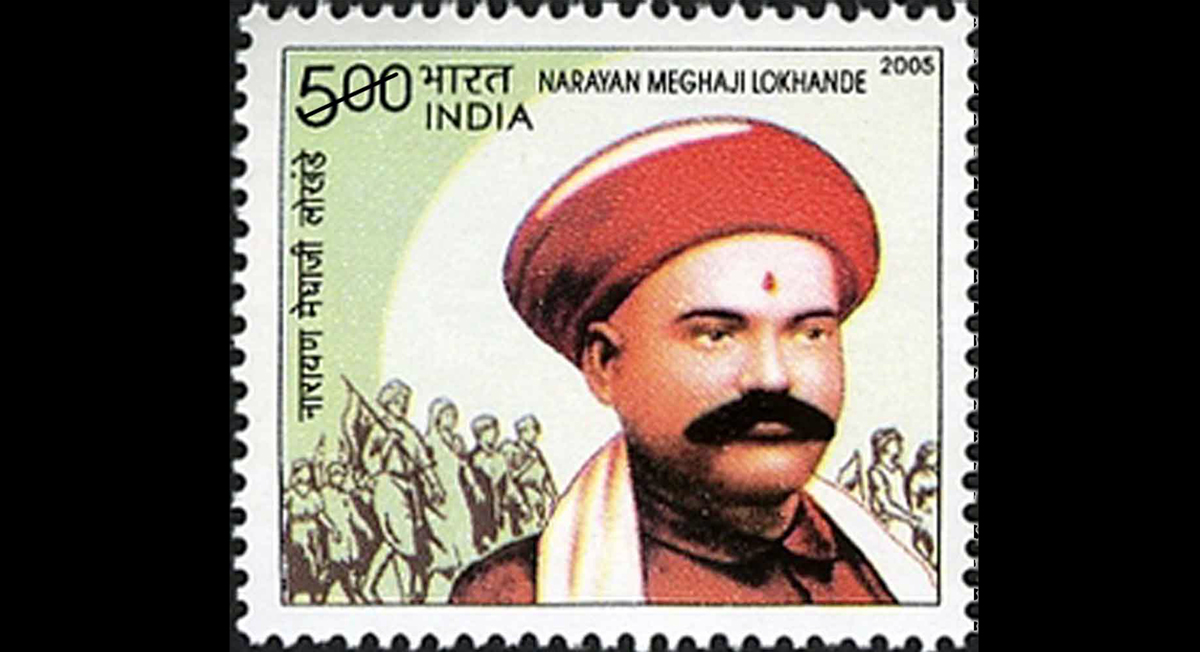H R Phonsa
Nothing on this earth has ever been obtained without struggle particularly when it is for the larger interests of a community. Baba Sahib Dr. Ambedkar said ” All things have a bill of costs attached to it, you cannot get it without paying the price”. However very well meaning persons of vision have struggled for matters of common causes. One among such persons who showed more concern for suffering of millions labourers without caring for his personal comforts was Narayan Meghaji Lokhande. The Indian employees then had to work all seven week days without getting any beak or rest time time. For Christians, Sunday is a day of religious observance and abstinence from work. The Jews observe from Friday evening to Saturday evening as a prayer and rest day. Christians attend Church services to pray in Church on every Sunday. So, Sunday is holiday in Christianity terming it as God’s day Christ on crucification on across rested in the grave on the Sabbath and rose the following day, beyond the end of the week. So for Christians the day following the Sabbath became known as “the Lord’s day” which was Sunday.
Rao Bahadur Narayan Meghaji Lokhande (1848-1897) struggled hard to get one day weekly off with full pay perks to Indian workers. He was a Dalit being born in Fulmali or florist,a Hindu untouchable caste. Florists grow flowers besides performing other agriculture based jobs. He was a contemporary and prominent colleague of another Revolutionary Mahatma Jyotirao Phuley of Poona(now Pune). Both belonged to mali caste now classified as Other Backward Caste. Both worked in unison in Satya Sodak Samaj movement and organized labour to fight for their rights.
Meghaji Lokhande was convinced that labourers needed at least a day’s rest .This way they can look after their family affairs for which they toil hard.So he approached the British Government of India in 1881 with a written request to give a day’s off from work to workers in a week. But the Government did not agree with his suggestion and the Indian workers continued to work seven days a week without any break. However in UK Sunday officially had become an off day since 1843. When the British Indian Government refused to accede to his suggestions for Sunday as holiday for Indian workers too, he started a campaign for it. His struggle gained strength with every passing day. This campaign continued long, for eight years. When Narayan Megaji Lokhanday’s struggle for the cause of toiling Indian workers gained strong momentum the British Government declared Sunday as holiday in 1889. The success of the movement launched and guided by Shri Rao Narayana M. Lokhanday was not only a big relief to the labourers but an encouragement for Indians to launch more such movements for mass benefits. Ever since protests, agitations, non cooperative movements became tool in Indian public hands to get their human rights enforced from the British rulers.
Meghaji Lokhande was a pioneer of the labour movement in India and Mahatama Phuley utilizing his wife’s services opened 18 schools in and around Poona, many for girls. Education to girls and untouchables was banned in Hindu shastras, particularly Manusumirity. To organize mill workers Meghaji Lokhande founded the Bombay Mill Hands Association ( BMHA).He was its first President too. Mahatama Jyotirao Phuley also addressed the meetings of the textile workers in Bombay. It is significant that before Lokhande , Jyotirao and his another colleagues Bhalekar had tried to organize the peasants and the workers, hardly anybody else or any organization had made any such attempt to redress worker’s grievances.
Lokhande is remembered not only for ameliorating the working conditions of textile mill-hands in the 19th century but also for his courageous initiatives on caste and communal issues. He was founding father of “Mumbai Kamgar Sangh”. He was appointed associate member of the Bombay Factory Commission in 1890. Meghaji Lokhande is acclaimed as the Father of the Trade Union Movement in India so was awarded title of ” Rai Bahadur” by the British Government for his exemplary work of labour welfare.
Some of the rights mill workers got because of Rai Bahadur Rao Narayan Meghaji Lokhande’s efforts were:
Mill workers got a weekly holiday on Sunday.
In the afternoon, workers should be entitled to half-hour recess.
The mill should have fixed working hours and should start working from 6:30 in the morning and close by sunset.
He demanded that the salaries of the workers should be given by the 15th of every month.
The Deenbandhu a Marathi-language newspaper was founded by Jyotirao Phule and K. R. Bhalekar in 1877. It was the first newspaper in India published from Bombay ( Now Mumbai) to cater explicitly for the labouring people. It served as an outlet for Phule’s Satyashodhak Samaj too. Narayan Meghaji Lokhande, took over the management of Deenbandhu published from Bombay. He had already been writing for it from 1880 and was selling 1650 copies per week in 1884, thus making it the second-highest circulated Marathi or Anglo-Marathi newspaper in Bombay Presidency, after Kesari another Marathi paper founded in 1881 by Lokmanya Bal Gangadhar Tilak.
While Lokhande published the Deenbandhu from Bombay, Vithhal Marutrao Nawle, an admirer of Phule, bought the rights to publish an edition in Pune. He imported a printing press from Ohio that continued to produce the newspaper until it ceased publication in the 1970s. (Wikipedia)
The Government of India issued a postage stamp with his photograph in 2005. He was the force behind forcing the British Crown to order weekly paid Public Holiday on Sunday for workers in India
Let us all salute the sweet memory of the Dalit Hero Rai Bahadur Rao Narayan Meghaji Lokhande becaue of whom Indian labourers and workers including employees are enjoying weekly Sunday as paid Holiday.


